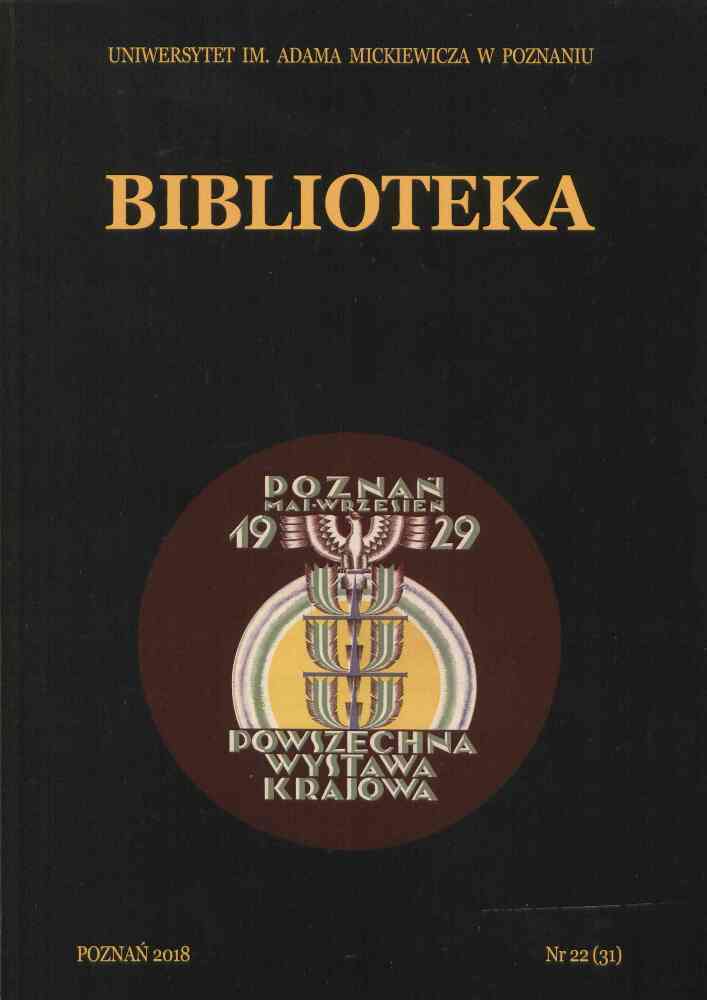Abstrakt
Masowe otwarte kursy online (Massive Open Online Courses – MOOC) zawierają w sobie potencjał, który zdolny jest stworzyć nowe możliwości w recepcji i edukacji odbiorców globalnych. A jednak, jak sugerują dostępne dane, jedynie niewielka część biorących udział w kursach MOOC uczestniczy w nich do końca i pomyślnie je kończy. Dodatkowo czynniki projektowania i implementacji kursów, które wpływają na proces zapamiętywania studenta, pozostają nadal nie do końca zrozumiałe. Artykuł przedstawia wyniki badania sondażowego przeprowadzonego wśród 379 uczestników kursów, studentów uniwersytetu kairskiego, biorących dobrowolnie udział w dowolnie wybranych kursach MOOC, którzy potraktowali je jako dodatkowy element kształtujący ich rozwój naukowy. 122 uczestników kursów (32,2%) ukończyło wybrany kurs. Pośród tej grupy nie zaobserwowano żadnych istotnych różnic w poziomie wykonania mających związek z płcią uczestników, aktualnym poziomem zaawansowania studiów (studenci przed licencjatem i studenci podyplomowi) czy też zastosowaniem konkretnej platformy MOOC. Badanie sondażowe dotyczące odbioru kursów wykonane po ich ukończeniu dowodzi, że treść kursu MOOC była znaczącym czynnikiem prognostycznym dotyczącym zdolności zapamiętania danego kursu, przy tej zależności ulegającej pośredniczącej reakcji wpływu treści kursu na spodziewaną efektywność kursu. Za kolejny istotny czynnik prognostyczny w zapamiętywaniu treści kursu uznano interakcję uczestnika z instruktorem danego kursu. Ogólnie rzecz biorąc, oba wspomniane konstrukty teoretyczne dpowiedzialne były za 79% wariancji dotyczących zdolności zapamiętywania kursów MOOC.Bibliografia
Adamopoulos P. (2013), What makes a great MOOC? An interdisciplinary analysis of student retention in online courses. In Thirty fourth international conference on information systems, Milan.
Alraimi K.M., Zo H., Ciganek A.P. (2015), Understanding the MOOCs continuance: the role of openness and reputation, „Computers and Education”, 80, s. 28–38.
Clow D. (2013), MOOCs and the funnel of participation, w: Proceedings of the third international conference on learning analytics and knowledge (LAK), Leuven, s. 185–189.
Davis F.D. (1989), Perceived usefulness, perceived ease of use, and user acceptance of information technology, „MIS Quarterly”, t. 13, nr 3, s. 319–340.
DeBoer J., Ho A.D., Stump G.S., Breslow L. (2014), Changing „course”: reconceptualizing educational variables for massive open online courses, „Educational Researcher”, t. 43 (2), s.74–84.
Ebben M., Murphy J.S. (2014), Unpacking MOOC scholarly discourse: a review of nascent MOOC scholarship, „Learning, Media and Technology”, t. 39 (3), s. 328–345, http://doi.org/10.1080/17439884.2013.878352.
Eom S.B., Wen H.J., Ashill N. (2006), The determinants of students’ perceived learning outcomes and satisfaction in university online education: an empirical investigation, „Decision Sciences Journal of Innovative Education”, t. 4 (2), s. 215–235.
Freitas S.I. de, Morgan J., Gibson D. (2015), Will MOOCs transform learning and teaching in higher education? Engagement and course retention in online learning provision, „British Journal of Educational Technology”, t. 46, s. 455–471, http://dx.doi.org/10.1111/bjet.12268.
Greene J.A., Oswald C.A., Pomerantz J. (2015, May 8), Predictors of retention and achievement in a massive open online course, „American Educational Research Journal” (Online First), http://doi.org/10.3102/0002831215584621.
Hew K.F. (2014), Promoting engagement in online courses: what strategies can we learn from three highly rated MOOCS, „British Journal of Educational Technology” (Online First), http://doi.org/10.1111/bjet.12235.
Kovanović V., Joksimović S., Gašević D., Siemens G., Hatala M. (2015), What public media reveals about MOOCs: a systematic analysis of news reports, „British Journal of Educational Technology”, t. 46 (3), s. 510–527, http://doi.org/10.1111/bjet.12277.
Liyanagunawardena T.R., Adams A.A., Williams S.A. (2013), MOOCs: a systematic study of the published literature 2008–2012, „The International Review of Research in Open and Distance Learning”, t. 14 (3), s. 202–227.
Marks R.B., Sibley S.D., Arbaugh J.B. (2005), A structural equation model of predictors for effective online learning, „Journal of Management Education”, t. 29 (4), s. 531–563.
Marshall S. (2014), Exploring the ethical implications of MOOCs, „Distance Education”, t. 35 (2), s. 250–262, http://doi.org/10.1080/01587919.2014.917706.
Mason R. (1991), Analyzing computer conferencing interactions, „International Journal of Computers in Adult Education and Training”, t. 2 (3), s. 161–173.
MIT News (2014, May 30), MIT and Harvard release de-identified learning data from open online courses, http://newsoffice.mit.edu/2014/mit-and-harvard-releasede-identified-learning-data-open-online-courses [dostęp: 20.08.2015].
Pappano L. (2012), The year of the MOOC, „New York Times”, November 2, http://www.nytimes.com/2012/11/04/education/edlife/massive-open-onlinecoursesare-multiplying-at-a-rapid-pace.html?pagewantedĽall&_rĽ0.
Peltier JW., Drago W., Schibrowsky J.A. (2003), Virtual communities and the assessment of online marketing education, „Journal of Marketing Education”, t. 25 (3), s. 260–276.
Peltier J.W., Schibrowsky J.A., Drago W. (2007), The interdependence of the factors influencing perceived quality of the online learning experience: a causal model, „Journal of Marketing Education”, t. 29 (2), s. 140–153.
Raffaghelli J.E., Cucchiara S., Persico D. (2015), Methodological approaches in MOOC research: retracing the myth of proteus, „British Journal of Educational Technology”, t. 46 (3), s.488–509, http://doi.org/10.1111/bjet.12279.
Reich J. (2014), MOOC completion and retention in the context of student intent, „EDUCAUSE Review”, http://www.educause.edu/ero/article/mooc-completion-andretention-context-student-intent [dostęp: 28.07.15].
Licencja
Prawa autorskie (c) 2018 Kate S. Honea, Ghada R. El Said

Utwór dostępny jest na licencji Creative Commons Uznanie autorstwa – Na tych samych warunkach 4.0 Miedzynarodowe.
Utwory opublikowane w czasopiśmie Biblioteka, na platformie Pressto należącej do Uniwersytetu im. Adama Mickiewicza w Poznaniu od 2015 roku są udostępniane na
licencji Creative Commons Uznanie autorstwa-Na tych samych warunkach 4.0 Międzynarodowe.
Tym samym wszyscy zainteresowani są uprawnieni do korzystania z utworów opublikowanych po 2015 roku pod następującymi warunkami:
- uznania autorstwa czyli obowiązek podania wraz z rozpowszechnianym utworem informacji o autorstwie, tytule, źródle (odnośniki do oryginalnego utworu, doi) oraz samej licencji
- na tych samych warunkach — remiksując utwór, przetwarzając go lub tworząc na jego podstawie, należy swoje dzieło rozpowszechniać na tej samej licencji, co oryginał.
Uniwersytet im. Adama Mickiewicza w Poznaniu zachowuje prawo do czasopisma jako całości (układ, forma graficzna, tytuł, projekt okładki, logo itp.).
Autor zachowuje prawa majątkowe, ale udziela zgody Uniwersytetowi im. Adama Mickiewicza w Poznaniu na wykorzystanie dzieła. Autorzy tekstów zakwalifikowanych do publikacji proszeni są o wypełnienie podpisanie i przesłanie umowy.
Jeżeli autor artykułu nie jest przekonany, że może wykorzystywać cudze utwory (np. ilustracje, fotografie, tabele) w ramach cytatu we własnej tekście musi dostarczyć do redakcji czasopisma zgodę od uprawnionych podmiotów.
Prawa są zastrzeżone do wszystkich tekstów opublikowanych przed rokiem 2015.





